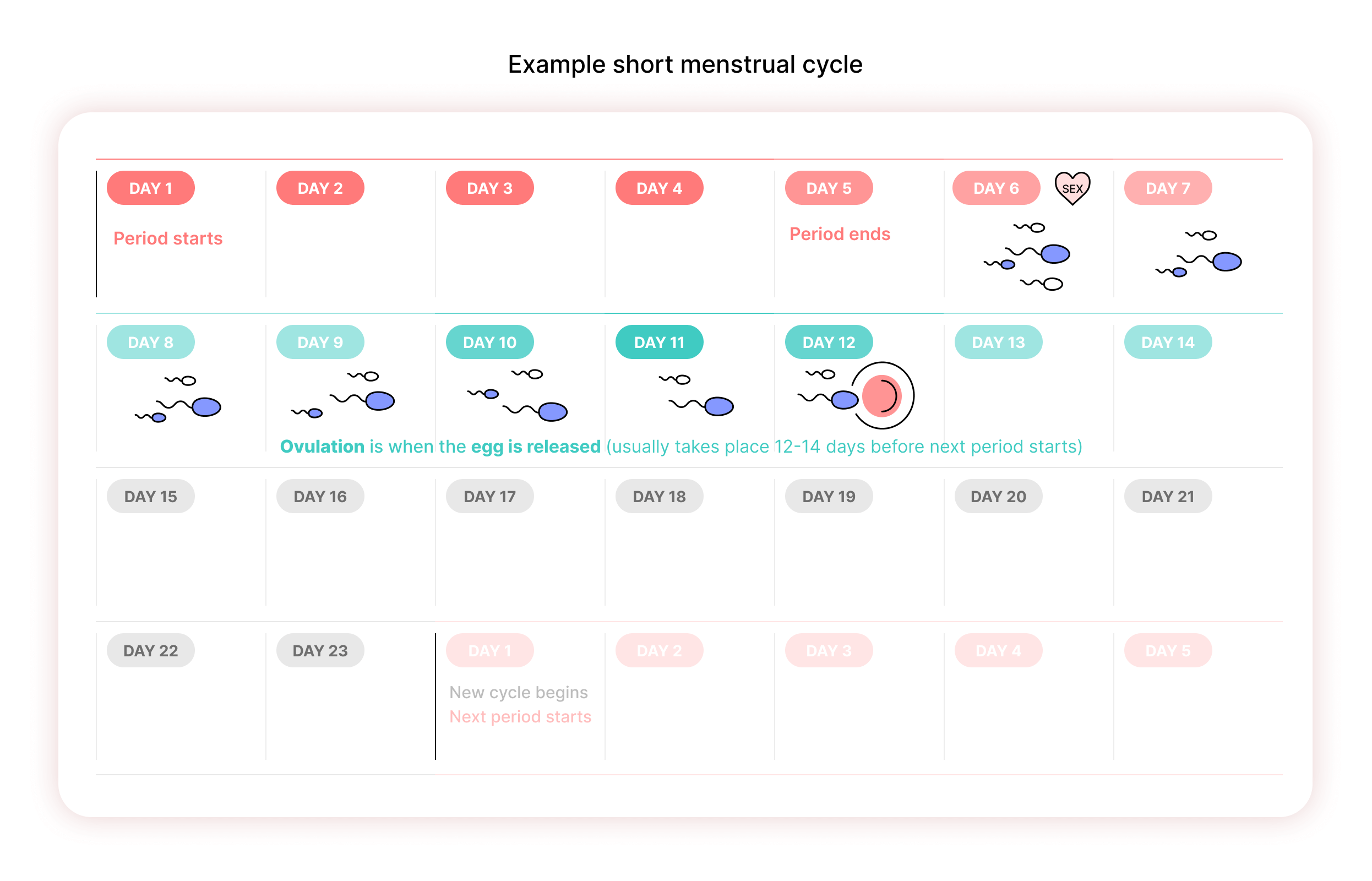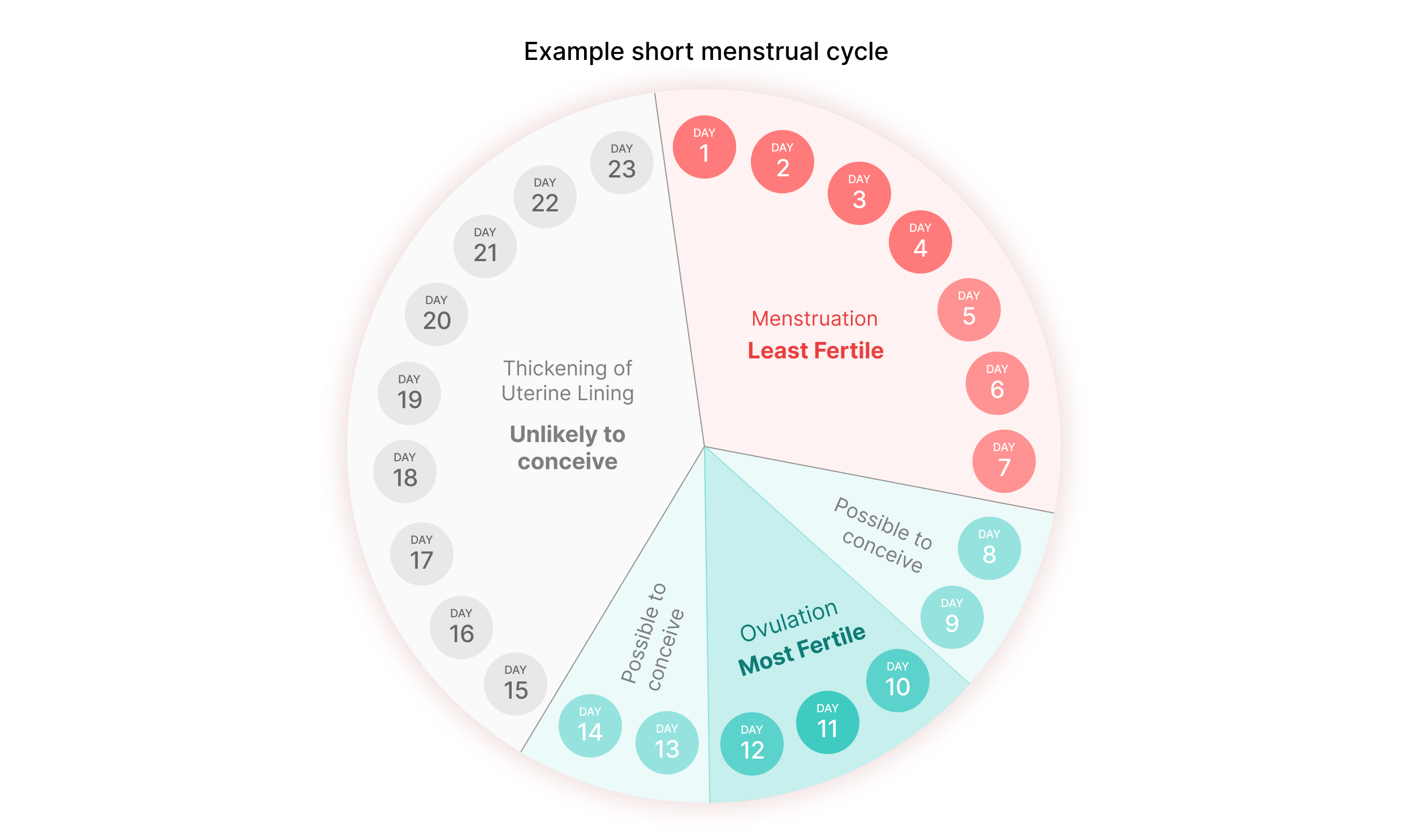Can you get pregnant on your period?
- Can you have sex on your period?
- How is it possible to get pregnant on your period?
- Can you get pregnant on your period if you have an irregular cycle?
- Can you get pregnant on your period while using birth control?
- Do you need a condom for sex when you’re on your period?
- Can you be pregnant and get your period?
- When is the best time to get pregnant?
- Contraception options from Online Doctor
Reviewed by Dr Mitra Dutt
Many people think that periods work like contraception, and that it’s impossible to get pregnant while you’re having your monthly bleed. However, this isn’t true – according to the NHS, there’s actually no “safe” time during your cycle when you can have completely unprotected sex. Read on to find out more.
Dr Mitra Dutt:
“The likelihood of you getting pregnant the day you start your period or 1 or 2 days after your period starts is incredibly low. However, it’s not unheard of. With every day that passes, after your period, your chance of getting pregnant increases. Even if you’re still bleeding.”
Can you have sex on your period?
First things first, yes, you can absolutely have sex on your period. There’s no harm in it for either party, provided you don’t have an STI that could infect your partner.
Of course, it’s normal to be a bit squeamish around blood, but period sex doesn’t always have to be messy, especially if you use condoms. If you’re feeling nervous, try having sex on a day when your period is lighter.
Period sex can actually be really fun and pleasurable, as many women find that their libido goes up around their period. As an added bonus, orgasms can help with menstrual cramps. Find out more here: Can you have sex on your period?
How is it possible to get pregnant on your period?
It’s very unlikely that having sex during your period will result in pregnancy – but it’s not impossible. Here’s why:
- The first thing to know is that most women will ovulate (release an egg) about 12 to 14 days before starting their next monthly bleed. The average menstrual cycle is 28 days. For most women, ovulation will happen between days 11 and 21 of their menstrual cycle.
- The second thing to know is that sperm can survive inside the body for up to seven days after sex. When an egg is released (during ovulation) it travels down the fallopian tube. It lives for about 12 –24 hours while it waits to be fertilised by a sperm. For conception to happen, the sperm has to fertilise an egg within 24 hours of ovulation.
In short, the average woman only has about eight or nine days during her cycle when she can get pregnant. However, everyone is different, and some people have a shorter cycle, which means that there is less time between the start of their period and ovulation.
As an example, if you were to have sex on the second day of your period and ovulate seven days later, there would be a risk of pregnancy. The chances of this happening are low, but because it’s not always easy to know when you’re going to ovulate, it’s difficult to predict the risk each time.
How it could be possible to get pregnant on your period if you have a shorter menstrual cycle:

Can you get pregnant on your period if you have an irregular cycle?
It is possible to get pregnant during your period if your periods are irregular. Having an irregular cycle where you miss a periodcan make it harder to predict when you’re ovulating. So, you may get pregnant accidentally.
Examples of irregular cycles include:
- Short cycles – The average menstrual cycle is 28 days but this can be shorter which means you could ovulate earlier than you think
- Periods that last a long time – your body could ovulate while you’re still shedding your womb lining from your last period
- Spotting when you ovulate – mistaking breakthrough bleeding for a period can mean you’re ovulating instead
Normally irregular periods are nothing to worry about. They can happen for a number of reasons such as puberty or stress. Sometimes irregular periods can be a sign that something isn’t quite right. If you’re worried speak to your doctor.
Example of a short menstrual cycle:

Can you get pregnant on your period while using birth control?
Yes, it’s possible to get pregnant if you have sex on your period even if you’re using contraception. No method of contraception is 100% reliable although many are 99% effective if used perfectly. The only 100% effective form of contraception is abstinence – not having sex. Find out about your contraception options.
The likelihood of getting pregnant based on your birth control option is:
- Combined pill – 1%
- Progestogen only pill – 1%
- Patch – 1%
- Vaginal ring – 1%
- Male condoms – 2%
- Female condoms - 5%
- Implant – less than 1%
- Contraceptive injection – Less than 1%
- Diaphragm – 4-8%
- IUD – less than 1%
Do you need a condom for sex when you’re on your period?
It’s always a good idea to use condoms when you’re having sex with a new or casual partner, as this is the best way to avoid STIs.
Other than that, you might need to use a condom if you’re not using any other contraception, or simply because you want to make period sex a bit less messy. Remember: it’s possible (although unlikely) to conceive after having sex during your period, so contraception is always advised if you don’t want to get pregnant.
If you don’t use a condom, or if the condom breaks during sex, it’s worth speaking to a healthcare professional about getting some emergency contraception.
Can you be pregnant and get your period?
You can’t have a full period while pregnant, but lots of women get something called implantation bleeding. This is a very light bleed – what is often called “spotting” – and it happens when the fertilised egg implants into the wall of your uterus. Because it usually happens around the time of your period, some women might mistake this bleeding for a very light period. Find out more about early signs of pregnancy.
“Technically it’s not possible to have a period and be pregnant”, says Dr Mitra Dutt. “However, you may experience different vaginal bleeding and discharge while pregnant”.
Unfortunately, bleeding during pregnancy can also be a sign of miscarriage or ectopic pregnancy – although this is usually accompanied by other symptoms like cramping and discharge.
When is the best time to get pregnant?
If you’re trying to get pregnant, your chances are highest around the time you ovulate. It’s not always easy to know exactly when this is, but you can narrow down the time by keeping track of your periods. Ovulation will usually happen about 12 to 14 days before your next period starts.
The NHS recommends that women who are trying to conceive should have sex every two to three days without any contraception. If you’re under 40 and you’re having sex regularly without contraception, there’s an 8 in 10 chance you’ll get pregnant within one year.
Other tips for women trying to conceive include:
- Cutting back on alcohol
- Quitting smoking
- Maintaining a healthy weight
- Having a healthy diet
You should also take 400 microgrms (mcg) of folic acid each day. This will help prevent the risk of birth defects if you get pregnant. Learn more about supplements and vitamins to take pre and during pregnancy.
Contraception options from Online Doctor
At Online Doctor, we stock a range of contraceptive pills, as well as the patch and vaginal ring. If you’re considering starting hormonal contraception, visit our contraception clinic to browse available pills and learn about your options.
Conclusion
Getting pregnant during your period is possible even if you’re using contraception. Using contraception as it’s meant to be used is a great way to avoid getting pregnant. If you do want to get pregnant, tracking your period and following a healthy lifestyle can help.
References
https://www.nhs.uk/common-health-questions/pregnancy/can-i-get-pregnant-just-after-my-period-has-finished/
https://www.nhs.uk/pregnancy/related-conditions/common-symptoms/vaginal-bleeding/
https://www.nhs.uk/pregnancy/trying-for-a-baby/trying-to-get-pregnant/
https://www.nhs.uk/pregnancy/keeping-well/vitamins-supplements-and-nutrition/
https://www.gov.uk/government/news/people-urged-to-practise-safer-sex-after-rise-in-stis-in-england
https://www.nhs.uk/conditions/irregular-periods/





